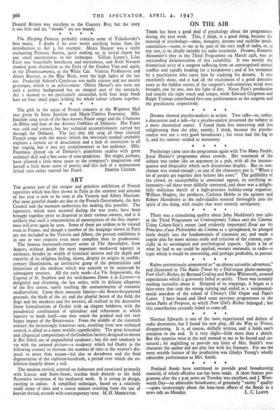ON THE AIR
THERE has been a good- deal of psychology about the programmes during the past week. This, I think, is a good thing, because the material of psychology—ideas thoughts, dreams and suchlike insub- stantialities—seems to me to psychology—ideas, part of the very stuff of radio, or, at any rate to be ideally suitable for radio treatment. Dreams, Kenneth Alexander's play in the Third Programme on March 24th, was an outstanding demonstration of this suitability. It was merely the dramatised story of a surgeon suffering from an unrecognised mental conflict and rapidly heading for a breakdown ; and of his treatment by a psychiatrist who cures him by studying his dreams. It was excellently done, and it had all the excitement of a good detective story as the hidden secret; of the surgeon's sub-conscious mind were brought, one by one, into the light of day. Nesta Pain's production had exactly the right touch and tempo, while Edward Chapman and Ralph Truman contributed first-rate performances as the surgeon and the psychiatrist respectively.
* * Dreams showed psycho-analysis in action. Two talks—or, rather, a discussion and a talk—by a psycho-analyst presented the subject in a more theoretical aspect. I found them less interesting and less enlightening than the play, mainly, I think, because the psycho- analyst was not a very good broadcaster ; his voice had the fog in it, and his manner tended to monotony.
* * Psychology came into the programme again with Too Many People, Joyce Hunter's programme about crowds. Her treatment of the subject was rather like an argument in a pub, with all the inconse- quence and-illogicality which such discussions display. But its con- clusion was sound enough • as one of the characters put it, "When a lot of people get together they behave like asses." The gullibility of the crowd, its susceptibility to emotional appeal, its terrifying in- humanity—all these were skilfully conveyed, and there was a delight- fully malicious sketch of a high-pressure holiday-camp organiser. William Hughes the producer, Carleton Hobbs as the agitator and Robert Mawdesley as the individualist entered thoroughly into the spirit of the thing, with results that were entirely satisfactory.
*
There was a stimulating quality about John Maddison's two talks in the Third Programme on Contemporary Values and the Cinema. Using Cohen-Seat's recent (and evidently important) Essai sur les Principes d'une Philosophic du Cinema as a springboard, he plunged fairly deeply into the fundamentals of cinematic art, and made a cogent plea for more serious study and criticism of the cinema, espe- cially in its sociological and psychological- aspects. Quite a lot of what he had to say could be applied, mutatis mutandis, to radio—a topic which it would be interesting, and perhaps profitable, to pursue.
* * Rather pretentiously announced as " an almost surrealist adventure," and illustrated in The Radio Times by a Dali-esque photo-montage, Poor Girl's Riches, by Bernard Coaling and Robin Whitworth, aroused expectations which it grievously failed to satisfy. There was certainly nothing surrealist about it. Stripped of its trappings, it began as a fairy-story that took the wrong turning and ended as a sentimental- moral anecdote of the school of Christy's Old Organ and Papa's Letter. I have heard and liked some previous programmes in the series Paths of Progress to which Poor Girl's Riches belonged ; but this contribution certainly failed to come off.
* * * * Norman Edwards is one of the most, experienced and deftest of radio dramatists, but I found his new play, All the Way to 'Frisco, disappointing. It is of course, skilfully written, and it holds one's attention to the end. It is very slight—little more than a sketch. But the surprise twist at the end seemed to me to be forced and un- natural; by negleCting to provide any hints of Mrs. Smith's true character the author did not play fair with his listeners. For me the most notable feature of the production was Gladys Young's wholly admirable performance as Mrs. Smith.
* * Fenland floods have continued to provide good broadcasting material, of which effective use has been made. A short feature pro- granune after the i p.m. news on Tuesday was excellent, and J. Went- worth Day—an admirable broadcaster, of genuinely " earthy " quality —spoke interestingly about the long-term effects of the floods ina


































 Previous page
Previous page